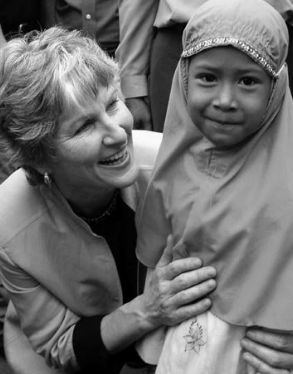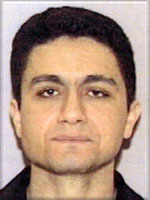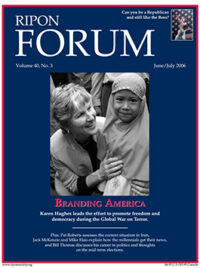Mohamad Atta. Hanji Hanjour. Ahmed Alhaznawi.
After nearly five years, we no longer remember all their names. But we remember their faces. And we will never forget their eyes.
They are the eyes of killers. They are the eyes of the 19 hijackers who commandeered four planes on September 11, 2001, taking the lives of over 3,000 people and taking us into a war which we continue to fight to this day.
In their eyes, we see not just the hatred we face, but the challenge we must overcome. It is the challenge of winning the hearts and minds of those who think us evil; of men and women who would do us harm; of children who want nothing more than to grow up and sacrifice their lives in the struggle against a country they’ve been taught to believe is Satan.
It is the challenge Karen Hughes faces in her job as Undersecretary of State for Public Diplomacy and Public Affairs. Appointed to her position by the President in March 2005, Hughes’ job is to promote the U.S. and our democratic system of government during the Global War on Terror. But at its most basic, her mission is to prevent another generation of Mohamad Attas from taking root in the Middle East and elsewhere around the world.
Strategic Imperatives

In speeches since taking office and in testimony on Capitol Hill, Hughes has outlined three “strategic imperatives” she intends to follow as she undertakes this mission and seeks to accomplish this goal. The first imperative is to offer people throughout the world a positive vision of hope and opportunity that is rooted in America’s belief in freedom, justice, opportunity and respect for all. Hughes expanded on this imperative in a May 10 speech before the Council on Foreign Relations in New York. “People around the world need to know that America proudly stands for not only our own rights,” she stated, “but also for human rights, human freedom, human dignity, the value of every person everywhere.”
The second strategic imperative is to isolate and marginalize violent extremists, while at the same time undermining the attempt by extremists to portray the West as being in conflict with Islam. To achieve this objective, Hughes believes it is critical that the U.S. not just empower mainstream voices in the Muslim community, but also demonstrate respect for Muslim cultures and their contributions to American society and societies around the world. “Theirs is a message of destruction and death,” Hughes declared to the Council on Foreign Relations last month, referring to the extremists, “ours a message of life and opportunity. And more and more people, including more and more Muslims across our world, are speaking up and saying that. And I think it’s very important that we empower the voices of our fellow Americans to join us in saying that.”
Hughes’ final imperative in this effort is to foster a sense of common interests and common values between Americans and people of different countries, cultures and faiths throughout the world. “We share so much,” Hughes told the House Committee on International Relations during a hearing last November. “People the world over want education and better lives for our children, people everywhere want to live in security, we all want jobs and economic opportunity.”
At its most basic, her [Hughes’] mission is to prevent another generation of Mohamad Attas from taking root in the Middle East and elsewhere around the world.
In carrying out these imperatives and meeting this challenge, Hughes faces an uphill battle, to be sure. In a well-publicized meeting with women’s rights activists in Turkey last September, for example, Hughes was sharply criticized for the U.S. invasion of Iraq and the instability some of those in attendance believed it has caused in the region. More recently and closer to home, the Government Accountability Office released a report in May in which it found that the State Department’s public diplomacy efforts, “generally lacked important strategic communication elements found in the private sector.” Among other things, the GAO found that State Department “posts in the Muslim world face several challenges in implementing their public diplomacy programs, including the need to balance security with public outreach and concerns related to staff numbers and language capabilities.” As an example, the report pointed out that “30 percent of language designated public diplomacy positions in the Muslim world were filled by officers without the requisite language skills.”
More Funding and New Initiatives
Hughes will be the first to admit that there is room for improvement in the Administration’s approach. Indeed, she said as much in her speech in New York last month. “We have much more to do,” she conceded. “This is a very long-term challenge.” To her credit, and to the credit of Secretary of State Condoleezza Rice and President Bush, Hughes is seeing to it that the effort she is spearheading to promote the U.S. and our system of government during the Global War on Terror – to “brand America,” if you will – receives the funding and resources it requires.
In fact, in the same report in which it criticizes the State Department for some of its public diplomacy efforts, the GAO acknowledges that the Bush Administration has increased public diplomacy resources to countries with significant Muslim populations in recent years. “Comparing data from fiscal years 2004 and 2006,” the GAO found, “regional bureau budgets for overseas operations increased by 21 percent in total, with the largest percentage going to the South Asia (39 percent), East Asia and the Pacific (28 percent), and Near East (25 percent) regions, each of which includes countries with large Muslim populations.”
At the same time, the Administration has established a number of new and innovative programs and initiatives intended to help the U.S. better communicate and interact with key audiences in the Muslim community and elsewhere around the world. These initiatives include a rapid response office within the State Department that will monitor international media, watching for news stories that portray the U.S. in an inaccurate light and issuing responses on an as needed and real time basis to set the record straight.

The Department has also established the Edward R. Murrow program, launched in conjunction with the Aspen Institute and six American universities, that will bring over 100 international media professionals to spend time at leading journalism schools in the U.S. The goal of this program is to encourage good journalistic practices around the world, and give journalists around the world a better understanding of our country. To encourage women’s entrepreneurship around the world, the Department has also established a women’s business exchange in conjunction with Fortune Magazine.
Assisting Hughes in overseeing these initiatives and programs is Dina Habib Powell, the Assistant Secretary of State for Educational and Cultural Affairs. Powell was born in Egypt and is fluent in Arabic. In the words of Condoleezza Rice, she represents the embodiment of what it means to be an American and to be part of a multiethnic democracy.” Increasingly, she is also joining Secretary Rice and Undersecretary Hughes in serving as a public face and voice of U.S. public diplomacy efforts in the Middle East.
Their challenge is a great one. And, in the end, it will take more than television appearances and talking points to win the hearts and minds of those whose only feeling toward the United States is one of hate. It will take actions, as well – actions by diplomats, actions by soldiers, actions by every American.
For we all have a stake in the war we are fighting, and we all have a role to play in spreading the principles of freedom and democracy – principles that, in the long run, will not only help change the conditions that promote extremism and terror, but principles that, for the past 230 years, have helped make America great.
Louis M. Zickar is the Editor of the Ripon Forum




